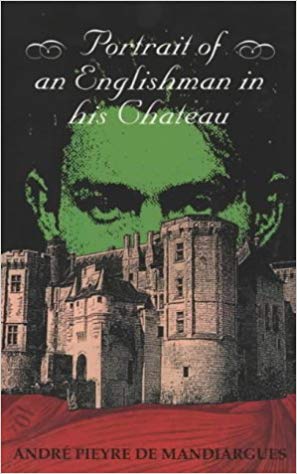 By ANDRE PIEYRE DE MANDIARGUES (Dedalus; 1953/99)
By ANDRE PIEYRE DE MANDIARGUES (Dedalus; 1953/99)
A profoundly vile piece of work that I’ve long wanted to read. L’ANGLAIS DECRIT DANS LE CHATEAU FERME was initially published in Paris (under the pseudonym Pierre Morion) back in 1953, and then banned for over 25 years. It took another 20 years for an English translation to appear, by J. Fletcher and the British publisher Dedalus. I really wish I could say it’s a maligned classic that fulfilled all my expectations, but…
It IS plenty disgusting, I’ll give it that, particularly for something written in 1953. It’s an erotic horror story with nearly every conceivable perversion and atrocity packed into its 138 pages, not unlike De Sade’s 120 DAYS OF SODOM in miniature.
The set-up is quite simple: the nameless, personality-free narrator is summoned to join the ultra-rich Englishman M. de Montcul, an old colleague, at his secluded chateau. There Montcul, being a depraved fuck, has gathered an assortment of women slaves he degrades and tortures in various unspeakable ways (most memorably via several hungry Octopi). The narrator, being the nonentity he is, doesn’t have much of a point of view on any of this, passively observing and even taking part in Montcul’s madness.
Lengthy reminisces by Montcul fill us in on his wartime atrocities, when he utilized the services of the French resistance to procure captured Nazi soldiers as victims for his tortures. Montcul also reveals that he keeps a buttload of explosives underneath the chateau which he plans to detonate one day, blowing the whole place sky high in one giant orgasm. But there’s still a final torture in store involving a woman and her young child that’s more hideous than all the others.
Andre Pieyre De Mandiargues, a novelist, playwright, critic and onetime associate of the surrealists, is best known for the novel THE MOTORCYCLE (adapted into the cult film GIRL ON A MOTORCYCLE). That book had a surreal erotic charm totally missing from the present one. That’s not to say this novel is in way poorly written, just that it’s extremely problematic. Those problems would appear to stem from its conception: De Mandiargues writes that the period of its writing was “a time of sheer and total happiness,” but “I felt it to be so brittle that I decided to exorcise its fragility by writing a tale” (in other words, he was bored) that was to be “the last word in eroticism and sadism.”
Yet that “last word” was already had by De Sade and Lautremont long before this book was conceived. Extreme though it is, it’s never especially shocking. De Mandiargues’s predecessors seemed driven by a real determination to transgress any and all boundaries, which is in large part what makes their work so profoundly disturbing. PORTRAIT OF AN ENGLISHMAN IN HIS CHATEAU, on the other hand, is powered primarily by an adolescent desire to shock, with hollow protagonists who exist only to move the plot forward and do terrible things.
